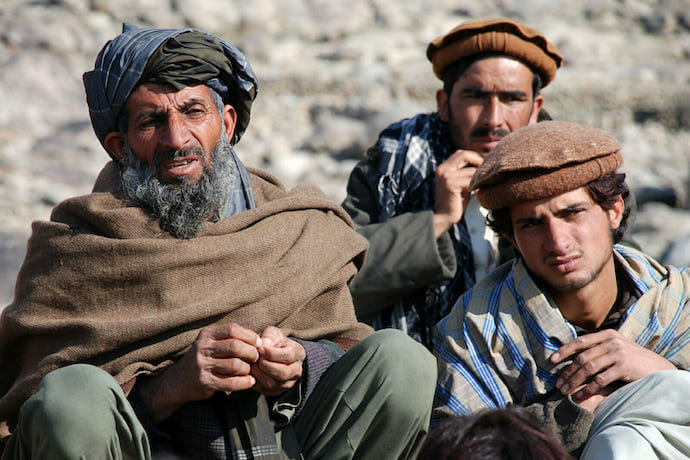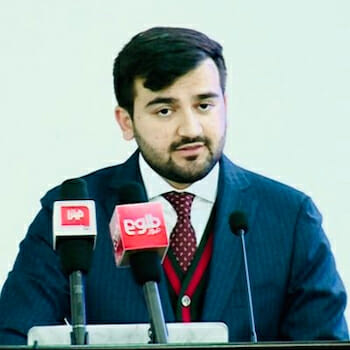
Great Powers in Afghanistan, Between Cooperation and Competition
On Thursday, April 25 representatives of the United States, Russia, and China convened at the first trilateral meeting on the Afghan Peace process in Moscow. At the conclusion of this meeting, the United States released a statement outlining the agreements reached during the trilateral consultation. This meeting was preceded by visits of the U.S. Special Representative for Afghan Reconciliation to both Beijing and Moscow in recent months. Following the trilateral diplomatic meeting, the U.S. Department of State released a statement outlining the agreements that the U.S. reached with the two countries with which it is increasingly at odds in the international forum.
The statement outlines eight key areas the three countries agreed upon. None of the points listed are new, and in fact, they have been at the forefront of American policy regarding its conduct in negotiations to end the war in Afghanistan since Ambassador Khalilzad assumed his role in the fall of 2018. For instance, the three sides agreed it is imperative for the Afghan Taliban to enter negotiations with the government of Afghanistan, which up until this date it has failed to do. Further, the three countries agreed that in any peace agreement a protocol must be developed that will ensure the Taliban will not allow Afghanistan to be used as a safe-haven for international terrorist groups as the country was at the beginning of the twentieth century. It was agreed upon that serious action must be taken to confront narcotrafficking in the country, an issue that is of grave concern to Russia in particular.
It is worth noting that this agreement of principles between the United States, Russia, and China comes amidst increasing tensions between Washington and both Moscow and Beijing. Currently, Beijing and Washington are in high stakes-trade talks after two years of economic tensions that some have coined as a trade war. Further, President Xi of China and President Trump of the United States are increasingly at odds regarding how to move forward regarding ongoing denuclearization talks with North Korea. Regarding Russia, analysts have predicted that the United States and Russia are entering into an arms race following the withdrawal of the two countries from the Intermediate-Range Nuclear Forces Treaty (INF). Further, the two countries are in direct contention over an array of multilateral issues and the two countries consider one another adversaries. It is also worth noting that multiple instances exist in which Russia and China are directly opposed to the United States in a combative manner, as is made evident by the political crisis in Venezuela.
It would be logical to ask why the United States is willing to cooperate with two countries it is in direct opposition with regarding peace negotiations in Afghanistan. A cynical answer might be that the United States under the leadership of Donald J. Trump is desperate to remove American troops from the country-one of his key campaign promises when he won the election in 2016. Further, it would not be farfetched to assume that Russia and China would gladly assume more leverage and control of the strategically located country of Afghanistan if the United States were to reduce its role in the country. It is imperative to examine the interests of the three countries in Afghanistan and if there is even the slightest possibility for their objectives to align.
The objectives of the United States in Afghanistan are likely the most known of the three countries. After withdrawing its troops from Afghanistan following the signing of the Geneva Accords with the Soviet Union in the late 1980s, the United was forced to return to the country following the horrific 9/11 attacks that killed nearly 3,000 people. Since then, the United States has maintained that it will never allow Afghanistan to be used as a safe haven for terrorists and has maintained a military presence in Afghanistan under three different presidents. While the United States has carried out admirable work in Afghanistan regarding women’s empowerment, development, and democratization, its underlying interests in the country have been in the field over counterterrorism. This is specifically the case under the presidency of Donald J. Trump. When outlining his administration’s South Asia strategy in August of 2017 Trump said “We are not nation building again. We are killing terrorists.” In short, the interests of the United States in Afghanistan are ensuring that the country never again serves as a safe haven for terrorist groups.

China has had a complex relationship with modern day Afghanistan since the eighteenth century when the Qing Dynasty conquered what is now known as Xinjiang. Specifically, members of the dominant ethnic group in the Xinjiang region, the Uighurs, who attempted to rebel against the Chinese dynasty sought refuge in the eastern Afghan province of Badakhshan. The aspect of Uighur dissidents in the Badakhshan province of Afghanistan continues to dominate the relationship between the two countries. Specifically, China has concerns about the East Turkestan Islamic Movement (EISM), an organization seeking to achieve the independence of China’s Xinjiang province through militant means. The EISM, which was classified as a terrorist group in 2003 by the U.S. Department of States and the United Nations alike has carried out multiple attacks, including one in Southwest China in 2014 that killed twenty-nine civilians. The ESIM currently has operational bases in Afghanistan, and several of its sects reportedly have linkages with the Taliban and the Islamic State.
The concern that China has regarding the EISM has only increased in recent years, as illustrated by the mass incarceration of up to a million ethnic Uighurs that has occurred in recent years. This mass incarceration of Uighers that has been called ethnic cleansing and even genocide will likely spur radicalization, only raising China’s concern. It is evident that China links security in its western province of Xinjiang directly to happenings in Afghanistan’s Badakhshan province. This is due to the nearly 4,500 Uighurs currently in Afghanistan, many of whom China considers to be terrorists. It is imperative to note that this by no means justifies the barbaric actions of the Chinese government in the Xinjiang province, which will only increase linkages between the EISM and radical groups in Afghanistan. However, it is essential to understand that because of this terrorist safe havens in rural, porous borders, international terrorist organizations are likely at the forefront of Beijing’s mind as it becomes increasingly engaged in Afghanistan.
Of the three, the United States, China, and Russia it is Russia’s interests in Afghanistan that are surrounded by the most ambiguity. Russia first became involved in Afghanistan at the height of the cold war, when it installed a communist regime that led to a prolonged war in the country. This led Russia to avoid becoming heavily involved in Afghanistan, leading former Afghan President Karzai to state that Afghanistan is likely the only place in the world where the interests of Moscow and Washington are aligned. Yet, this began to change after 2010 when the Russian government began to express its frustration with the perceived failures of western efforts to halt narco-trafficking in Afghanistan. This is largely due to the substantial amount of narcotics that are trafficked through Central Asian states into Russia before entering global markets. Russia became only more critical of western counternarcotic efforts in Afghanistan in 2014 when the United States placed sanctions on the head of Russia’s anti-doping agency, Viktor Ivanov, which Moscow described as “burying a promising line of cooperation.”
Russia’s frustration with western counternarcotic efforts in Afghanistan was only underlined in December of 2017 when Russian Foreign Minister Lavrov stated that the west had a “double standard” regarding its policy in Afghanistan that was causing the country’s narcotics trade to expand. Russia’s frustration with the narcotics trade in central Asia, which originates in Afghanistan, has reportedly led to the Afghan government cooperating with the Taliban in order to halt the trade. While the extent to which Russia has cooperated with the Taliban in Afghanistan is not known, General Nicholson who previously commanded U.S. troops in Afghanistan claimed that it is a significant amount.
In addition to narcotics, Russia is reportedly concerned about the growing presence of the Islamic State in Afghanistan. The Islamic State has carried out an array of attacks in Russia, including the bombing of the Saint Petersburg Metro in 2017 that killed fifteen people. Russia’s fears of the Islamic State gaining a stronghold in Afghanistan have reportedly caused it to cooperate with the Taliban in order to counter them. Little is known about this effort, but it is clear that Russia takes the threat seriously.
In short, much ambiguity surrounds the policy of Russia in Afghanistan. It is evident that the issues at the forefront of Moscow’s mind in its engagement in the country are centered around counternarcotics and the threat posed by the Islamic State. This leads Russia to focus extensively on law-enforcement mechanisms and securing borders. Further, the extent to which Russia has already cooperated with the Taliban makes evident that the country is willing to work with an array of actors to achieve its objectives.
In examining the interests of the United States, China, and Russia in Afghanistan, it appears that the three share similar interests, at least on the surface. The three countries are all concerned with terrorism and the notion that Afghanistan could be utilized as a safe haven by the Islamic State or other terrorist groups to conduct attacks on another country’s soil. Further, the three share concerns about transnational crime, law-enforcement, and porous borders.
It is true that in many ways, the world appears to be returning to an area of great power competition in which nation-states compete against another. However, in Afghanistan, it appears that the interests and objectives of three main powers, the United States, China, and Russia are actually in alignment. Therefore, could the agreements reached between the three powers in Moscow on April 25 pave the way for Afghanistan to become a field for great power cooperation, instead of competition? Not only could this be a positive change in global geopolitical occurrences, but it could also be crucial for creating the foundations of a just and lasting peace in Afghanistan. Potentially, this could be naive thinking, yet when a country has suffered from decades of war and violence at the expense of its population, is there any other option?


